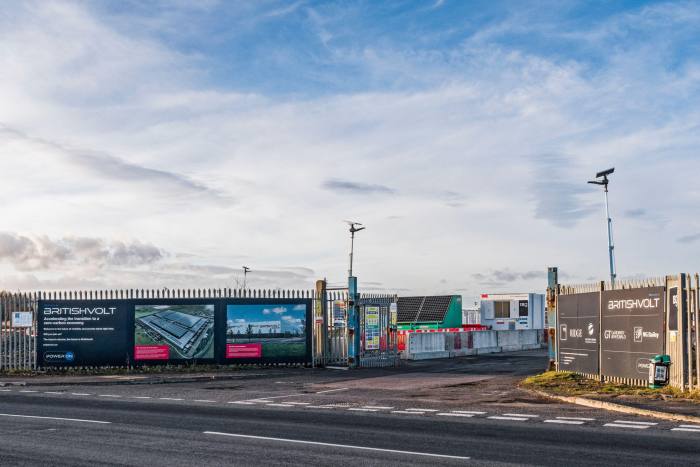[ad_1]
When Britishvolt was formed three years ago with the ambitions of spearheading the UK’s battery industry, it had nothing: no factory site, no in-house technology, no customers and precious little funding.
Since then, it has worked to piece together the building blocks that will, it hopes, one day transform it into a credible business.
The company hired known automotive leaders; it garnered tens of millions in financial backing from investors including Glencore and a grant from the British government; it secured a world-class site for a £3.8bn “gigafactory” in Blyth, north-east England, and announced plans to begin production in 2023. Most impressively, it developed its own fledgling battery technology in partnership with a UK university.
Now, Britishvolt believes that securing the final piece of the jigsaw puzzle — paying customers — is only months away.
“They are very close to getting away with it,” says one person who previously worked for the business.
Yet underneath the surface, the company is still wrestling not only with the customary growing pains of a fast-hiring start-up, but also with the more fundamental need to establish a business model, amid what one person familiar with the business describes as a “chaotic” atmosphere.
Britishvolt has yet to demonstrate in public that the equipment it promises will be “market-leading” actually works. The Blyth gigafactory will not be ready until 2025, a delay that means even carmakers that want its kit in large numbers will need to find another supplier of batteries for their debut models.
All the while, the business is burning through £3mn of cash on salaries alone each month, a consequence of hiring close to 300 people while still years from generating revenue. Last month, its co-founder and chief executive stepped down.

It is in the middle of another funding round — its second in two years — while accounts covering the period from December 2019 to January 2021 show a loss of £8.8mn, and warn of “material uncertainties that may cast significant doubt on the company’s ability to continue as a going concern”.
Even longtime supporters within the ranks of government now put the company’s odds of survival at 50-50.
An “element of risk” was baked into the model to begin with, says Neil Slater, global head of real assets at Abrdn, whose Tritax real estate unit is partnering with Britishvolt to provide funding for construction of the plant at Blyth. “This is not Ford that is coming in and saying we’re putting billions of dollars into it — it’s a start-up, albeit one with a credible proposition.”
There is more riding on the company’s fortunes than just the pride of its staff, many of whom have been offered share options and told that a stock market listing will, one day, make them all “millionaires”.
The success or failure of Britishvolt will also have an effect on the UK’s brittle auto industry, which is navigating its way through the shift towards selling only electric vehicles by 2035. Without battery production capacity in the UK, analysts warn the car industry will eventually leave Britain for continental Europe.
Blyth is reckoned to be the best UK site for such production: it has a deep seaport, lots of space and access to abundant green electricity through an undersea interconnector. But by snapping it up, Britishvolt has made it harder for the government to convince other, more established, businesses such as Chinese battery giant CATL or South Korea’s LG to set up shop in the UK.

Furthermore, ministers have also promised Britishvolt £100mn to help build the factory, both draining resources from the finite pot needed to tempt other international investors, and also saddling the government to the fortunes of the fledgling enterprise.
One minister in Boris Johnson’s government would regularly phone wary carmakers, asking them to meet Britishvolt executives, according to two people.
The government money was to be drawn as its projects develop. However, as global markets tighten, the company is now trying to draw down some of the money early as it worries about securing enough from external investors, according to two people.
Britishvolt spokesman Ben Kilbey says the state of the economy is affecting his company, along with many others. “Current market conditions are wild, from currency depreciation, rapid inflation and rising core interest rates, of which no company is immune,” he says.
Biggest battery makers: CATL

Key clients: Tesla, BMW, Great Wall, Honda, Hyundai, VW
Sales (first half 2022):
$13bn
Source: SNE Research
Asked about the company’s early period, and questions over its future prospects, he admits the business has experienced “teething issues”. “Britishvolt is a young, rapidly growing company, one of the fastest growing tech firms on the planet,” he says. “We have the right and proper governance and procedures in place to counter and learn to improve.”
Officials have put the cart before the horse, some say. “If you look at all the cell factories all over Europe, they are being built on the back of having at least one launch customer,” says Ian Henry, an automotive manufacturing expert. CATL, for example, built its plant in Hungary only after winning a contract to supply the Mercedes-Benz plant in the same country.
“If we want to have a battery industry in the UK, they have to work hand in glove with the car industry to bring in the companies. This obsession with trying to build a world-class industry of our own, while it may seem laudable, is questionable.”
The search for customers
Britishvolt was founded in 2019 by Orral Nadjari, a former banker in Abu Dhabi, and Swedish entrepreneur Lars Carlstrom.
Nadjari, who became chief executive, had no automotive background, a highly unusual trait in a founder of a company that was, by its own admittance, hoping to focus on the automotive industry. By contrast Northvolt, a battery start-up that is backed by Volkswagen and Volvo and has a working gigafactory in northern Sweden, was founded by two former Tesla employees.
Carlstrom had at least started his career as a sales manager for Saab, but left Britishvolt in 2020 after it emerged he had been convicted of tax fraud in Sweden in the 1990s.
Initially the company intended to license technology from existing battery manufacturers, and sell batteries to UK car factories. Instead, it embarked on developing its own in-house technology, alongside battery experts at the Warwick Manufacturing Group. Its ambition for the Blyth gigafactory is to produce at least 30 gigawatt hours a year of batteries.
But to do that it will need customers. Britishvolt has been banking on the shortage of British-built alternatives to help steer carmakers to its doors. Currently, there is only one major battery maker — Nissan’s supplier Envision — with a producing UK site.
So far, Britishvolt has publicly secured deals with two UK carmakers: Aston Martin and Lotus. Both are merely exploratory deals through memorandums of understanding. Neither auto brand has agreed to buy anything from the company.
This did not stop Britishvolt initially presenting both arrangements as likely to lead to firm orders when talking to ministers, according to two people with knowledge of the discussions. (the company denies this).

Yet despite signing deals in January and March, as of last month, neither Lotus nor Aston had been sent any prototype battery cells, according to people close to each company.
Both carmakers are also already exploring alternatives to Britishvolt for their technology, according to figures close to both companies.
Lawrence Stroll, Aston’s chair, told the Financial Times that the company was also considering using battery technology from Lucid, an electric car start-up, or Mercedes for its first electric vehicle in 2025. It plans to make a decision on which partner to use by the end of this year.
“High-value automotive customers tend to be small,” says one investor who met with Britishvolt. “[The start-up] needs to strike a difficult balance between high-value applications and securing volumes from large car companies.”
Yet Britishvolt has not named any UK carmakers that will order batteries in significant numbers, such as a Toyota or Jaguar Land Rover.
A senior director at one carmaker that entered talks with Britishvolt describes the company as “smoke and mirrors.”
Changes at the top
As it seeks a new round of funding, Britishvolt has made moves to show investors it is serious about building a business. Last month the company parted ways with Nadjari, whom employees describe as a changeable, sometimes challenging boss.
His manner tilted from ebullience to anger, at times within the same meeting, according to several Britishvolt workers. He had a tendency to cut off others, including more experienced colleagues.
“He had no control over his temper and it created issues for the company,” says one former employee who worked closely with Nadjari. “When he talks, nobody else was able to talk.”
Speaking from his home in Abu Dhabi, Nadjari concedes he brings a “bulldozer visionary entrepreneurial spirit” to his work. “I’m so passionate sometimes it can be misunderstood as other things,” he says.
“Was I the perfect CEO? No, definitely not. Do I have a lot to learn from my journey? Yes. But am I always going to protect my baby? Of course I am.”
Colleagues say he took a persistently light-hearted approach that made him seem unserious. Initial meetings with ministers to secure grant funding went so badly that Britishvolt sidelined Nadjari, according to three people with knowledge of the discussions. Instead, it hired former Ford UK director Graham Hoare to lead its government talks.

Nadjari disputes this, and says he hired Hoare “as a natural successor as CEO, and because of his vast experience dealing with government”, as well as to help with the structure of the fast-growing business.
As the company expanded, Hoare gradually took on more responsibility for the running of the operations, while Nadjari became increasingly less involved.
His departure was billed as his decision, though four people familiar with the events say the board advised him to step down, in part because potential investors were put off by his style.
Biggest battery makers: LG Energy Solution

Key clients: Tesla, GM, Renault, Hyundai, VW
Sales (first half 2022):
$5.8bn
Nadjari strongly denies this characterisation of his departure, saying he told the board in 2021 that he planned to leave this summer, and pointing out that he helped bring significant investors including Glencore into the business. He remains the company’s largest shareholder.
“He is a brilliant mercurial CEO who has got things up and running. It’s now getting to a very serious stage where they’ve opted to bring in broader experience and perhaps a less entrepreneurial approach at this stage in the journey,” says Slater at Abrdn.
The company has now passed into automotive hands: Peter Rolton, who worked for the government’s Renewables Advisory Board and has worked closely with carmakers including Honda and Nissan, is the chair, while Hoare is the acting chief executive and is widely expected to be named in the position full time.

Supporters of the company hope the change of management will bring about much-needed professionalism into the business.
“It does appear chaotic, which is acceptable in a start-up,” says one person who was close to the business. “It’s a question of whether the chaos settles down.”
Yet even with new management on board, potential investors question the company’s business case due to the lack of firm customers, as well as its cash burn.
“They have employed more than 300 people in a company without any business, which has drained the company of funds,” says one person who knows the company well.
“Even if they brought on board a number of experienced automotive profiles, they need to be aware that a gigafactory is not the automotive industry, it’s the chemical industry.”
Tech trouble
Potential investors are aware that the entire promise of the business rests on finding buyers for its yet-to-be-revealed technology.
“Raising funding at the moment is their key risk and that’s related to securing end customers,” says one investor familiar with the company.
But some would-be clients say the company’s approaches were cack-handed. Last year, Britishvolt contacted one carmaker offering prototype cells that it would be ready to deliver within “weeks”.
Biggest battery makers: Panasonic

Key clients: Tesla, Toyota
Sales (first half 2022):
$2.2bn
The carmaker, which already had several of its own in-house prototype cells, was nevertheless curious to see the technology and agreed. Months of silence followed.
Eventually, Britishvolt contacted them again, out of the blue, offering the same prototypes.
The carmaker patiently agreed, but once again heard nothing back, and eventually gave up sending chasing messages.
Whether disorganisation of a fledgling business, or whether the technology did not work yet, the business — one of the UK’s most respected manufacturers — was left underwhelmed.
“The [prototypes] are the easy bit,” says one senior executive at the carmaker in question. “If you haven’t got that bit right, you haven’t got anything.”
Britishvolt now says its cells will be shipped to seven carmakers this month, including one “blue-chip” manufacturer, for testing. “We need to give them the benefit of the doubt,” says one government figure. “At this point it comes down to whether those cells [being shipped to customers] are any good.”
The business case
The challenges the company has faced raise questions about the overall business strategy of being a British provider of batteries for UK automakers.
Henry says being located in the UK is no guarantee of winning work from British factories, which are able to ship in batteries internationally. “You don’t ship completed batteries long distances, but there are plenty of cases where the cells and modules travel long distances,” he says, such as BMW importing batteries for the Oxford-built electric Mini from Germany.
At the same time, some UK automakers are looking to bring this kind of manufacturing in-house. One of the UK’s largest car manufacturers, Jaguar Land Rover, which belongs to the Tata Group, is working on its own plans to establish battery manufacturing in Europe.
Britishvolt has at least excelled in capturing the British establishment’s desire to build domestic battery manufacturing to underpin its automotive industry, says Hans Eric Melin, managing director of Circular Energy Storage, a lithium-ion battery recycling consultancy.
“I’m surprised how far it has gone,” he says. “It started with people who had no background at all in battery manufacturing. It took a long time until they got real expertise in the group.”
But the new leadership has a way to go before proving the company is a viable concern, Melin adds. He has seen no evidence of Britishvolt securing orders or public demonstration of its own in-house technology. “The only thing we are talking about here is a plant — a big flat piece of land where you will build a battery plant.”
Data visualisation by Ian Bott
[ad_2]
Source link

